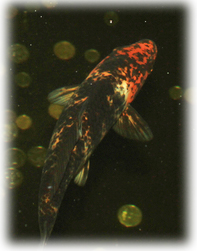
Living in a Phantom Hut A wolf-hair brush in a yellow jar, ice on a pool at dawn,
a single koi rising, Basho on the road to the deep north:
There is nothing you can see that is not a flower;
there is nothing you can think that is not the moon.
A tuft of hair hooked on a strand of barbed wire,
a rusted fence above the Barriere River, white water,
old volcanoes, a crow picking at caribou bones, content.
Those mountains I wandered through when I was young.
There was need for a small fire in the night. Still,
I wept back then for what could not be undone.
Old misfortunes can bring a man peace.
My face reveals my face, my hands my hands.
There is nowhere I can go where I haven’t been.
When I hold the brush to my ear I hear the moon.
— lines 3 and 4 are by Matsuo Basho, 1644–1694, a master poet of the Edo Period of Japan
— Barriere River is tributary of the North Thompson River so named because of fish traps placed across the river mouth by the Secwepemc people
The title comes from Basho’s late narrative poem about the simple hut in the mountains where he lived at the end of his life, Genjuan no Fu, translated as, “Record of the Hut of the Phantom,” or, “The Unreal Dwelling.’’

Chacabuco
Remote fetish, this stone sherd common as a beetle in grave litter.
The wind scours, a fragment only, a red blush thin in the light.
How the desert is a library, the fate of thought worn thin as fragile cities.
A broken arrowhead among the remains of a condor, the bones
narrow flutes the colour of clouds at dawn. Children play in the dust.
Not yet a woman, a girl leads the others in song, her story the oldest one:
how love leaves us as a white goose who flees south to the salt marshes.
Its wings cup the air under the sickle moon.
Vultures leap among the stones
as a man leafs through the ancient book of trees.
The names diminish, the ink fades, letters sand mites hiding from the sun.
The mind is a stump in nitrate slag, desiccated rings.
There are no words beyond the wind.
The old ones held the babies across the wire in the hope someone might take them.
Rags and tatters. All that is left of the days in the Atacama.
Chacabuco — abandoned nitrate town in the Atacama desert
Atacama — ”Desierto de Atacama” — driest non-polar desert in the world — a 1000 mile plateau along the Pacific coast west of the Andes
Kintsugi
The raccoon washes with slender fingers a broken moon.
A frog hangs from its life, one leg pinned by a tooth.
Fog forms dew on my face and I weep without intent.
Over the waters the crippled cedars hang in the remains of storms.
Their branches reach now for the sea.
Like the raccoon, I’m distracted by the task at hand.
As now, the scars without my body greater than the scars within.
Bones shine through my skin.
Tonight I cradled my woman as she slept into the night. Such peace.
I am outside myself, without disguise.
There is only a little left to know. Water returns to water.
The dew in my eyes, a moment ago an ocean.
On the face of a golden puddle the moon repairs itself again and yet, again.
Kintsugi — “golden repair,“ the Japanese art of repairing broken pottery by mixing lacquer with powdered gold. The repair of a broken bowl is only one its many possible beauties.

In the Dry Hills West of Hermosillo
Sing to me of the nightriders in their embattled passing.
I thought their harness song the Elf owls crying
from the pale flowers of the saguaro. The little ones warned me
when I was lost in the dry hills west of Hermosillo.
Their chuckles were the death song of blood beetles.
The owls hunted them in the shadows of the chaparral.
They told me there was nowhere to hide.
When the moon appeared it was a silver blade
so thin I thought a god had closed her eye.
Alone, I frightened the Sphinx moths, and the owls came to feast.
The moths as they fled left the dust from their wings on my hands.
And then the passing of the riders.
Their song still chases me, pitapat, pitapat, down the empty roads.
- Elf owl, Miucrathene whitney, the smallest of the owls (5” tall)
- Saguaro, (Mayo language) genus Carnegeia, tree cactus of the Sonora Desert
- Hermosillo, city in Mexican State of Sonora.
- Sphinx moth, Lepidoptera, Sphingidai, narrow-winged hawk moth